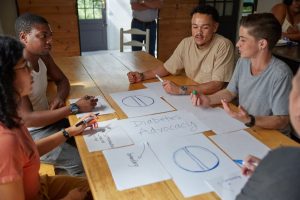5 Chapter 5 – Socialization
Socialization
 Socialization is the process through which individuals learn to become members of society, or specific social groups, and operate within them. This involves grasping rules, norms, expectations, beliefs, values, and roles etc. Throughout life, you will take on various roles, for example, student, parent, volunteer, or friend, each accompanied by specific behavioral expectations. You will also become an employee and need to learn the ways of many organizations in your lifetime. Socialization represents the evolution of the interaction between you and a job. It is where your ways and the ways of the organization intersect. Being proactive at socialization will empower you to interact with the organization in both practical and aspirational ways.
Socialization is the process through which individuals learn to become members of society, or specific social groups, and operate within them. This involves grasping rules, norms, expectations, beliefs, values, and roles etc. Throughout life, you will take on various roles, for example, student, parent, volunteer, or friend, each accompanied by specific behavioral expectations. You will also become an employee and need to learn the ways of many organizations in your lifetime. Socialization represents the evolution of the interaction between you and a job. It is where your ways and the ways of the organization intersect. Being proactive at socialization will empower you to interact with the organization in both practical and aspirational ways.
Framework
The first stage of socialization, known as Anticipatory Socialization, takes place even before you officially join an organization. During this phase, you develop expectations about work ethic, occupations, specific jobs, and organizations. This stage is split into two distinct types.
- Vocational Anticipatory Socialization is a lifelong process that starts in early childhood, where you gather general knowledge about careers and different professions.
- Organizational Anticipatory Socialization is more targeted. It begins when you start considering specific jobs and organizations, and it continues until the job search concludes.
For those about to find a new job, Organizational Anticipatory Socialization is the phase you’re in. Your pre-existing beliefs about jobs, careers, organizations, work, and the workplace will influence how you perceive and interpret information, and approach your new role as a placement student. Pay attention to how these initial expectations shape your understanding, actions, and communication as you transition into your new work environment (this connects to what the ethnographer knows as bias).
The second stage of socialization, called the Encounter phase, is when you first start working in an organization. During this time period, you’ll get familiar with your role, responsibilities, and the company’s culture. This phase is often marked by high levels of uncertainty as you figure out your tasks, relationships, and how things work. To ease this uncertainty, it is common to rely on information from interactions with supervisors and coworkers. The better your relationships with those around you, the better the information you’ll receive, making it important to build strong, supportive connections right from the start. Understanding organizational structures and having the self-awareness to navigate them intentionally (as encouraged by this book) will also help you in this stage.
 In the Encounter phase, you commonly employ different information-seeking strategies to reduce uncertainty. These methods include asking direct or indirect questions, consulting others not directly involved, testing boundaries, disguising conversations, observing, and surveillance. The choice of tactic depends on several factors, including the social costs associated with seeking information and the amount and importance of the uncertainty experienced. In a culture of openness, it is much easier to ask questions and reveal that you are unsure. Although it can be daunting when you are not sure how questions will be received, it is usually better to ask them as it enables you to get insight into the direct content of the question as well as the beliefs and culture of the organization you will become part of.
In the Encounter phase, you commonly employ different information-seeking strategies to reduce uncertainty. These methods include asking direct or indirect questions, consulting others not directly involved, testing boundaries, disguising conversations, observing, and surveillance. The choice of tactic depends on several factors, including the social costs associated with seeking information and the amount and importance of the uncertainty experienced. In a culture of openness, it is much easier to ask questions and reveal that you are unsure. Although it can be daunting when you are not sure how questions will be received, it is usually better to ask them as it enables you to get insight into the direct content of the question as well as the beliefs and culture of the organization you will become part of.
The third stage, Metamorphosis, is when you perceive yourself as an established member of the organization rather than a newcomer. This stage represents a long-term settling-in, where you transition to a full member of the organization. It involves being aligned with organizational structures. It can also involve what is called, “individualization” efforts by the member (see Job Crafting in the callout box). As people adapt in new roles and gain trust, many ‘negotiate’ with supervisors and coworkers to perform their roles in ways that suit their abilities and preferences. Sometimes this is not spoken of overtly but shaped by the employee themselves or the supervisor’s observations of employee strengths.
The final stage, Exit/Disengagement, occurs when you plan to leave the organization. This phase represents the end of the socialization process within a particular organization, but the beginning of a new cycle of anticipatory socialization for the next job or organization.
Being Proactive During Socialization
Initially, research on organizational socialization concentrated on how organizations could facilitate newcomers’ adjustment (Van Maanen & Schein, 1979). Today, it’s clear that successful socialization is a collaborative process. While organizations provide information, newcomers—you—play an essential role in shaping your own experiences. Socialization involves a back-and-forth process where both the organization and the individual get to know and influence each other. This is so important that I will say it again. Don’t rely solely on the organization to be in charge of your adaptation. Take initiative, and then ask many questions about your job, norms, culture, decision-making, priorities etc.. Seek feedback, and actively engage with your environment to shape a successful integration.
Opportunity for action and change
Socialization is where your personal ways of interacting meet and merge with an organization’s culture, norms, and expectations. By exercising agency through proactive behaviors, you can significantly impact how you adapt and contribute to your new role (Ashforth et al., 2007, Wanberg and Kammeyer-Mueller, 2000; Zhao et al., 2022). Three key proactive behaviors enhance this process:
- Sensemaking: This involves seeking information and feedback. Use these strategies to reduce uncertainty and make sense of your new situations. Sensemaking is especially important for newcomers who are more likely to misinterpret the environment, make mistakes, and violate organizational norms.
- Relationship Building: This refers to behaviors directed toward initiating social interaction in the work environment. Building relationships with your boss is related to job performance, and general relationship building is related to higher job satisfaction. Social support from coworkers is related to higher levels of job satisfaction and organizational commitment.
- Positive Framing: This is a cognitive self-management mechanism you can use to alter your understanding of a situation by explicitly controlling the cognitive frame you place on it. For instance, seeing a difficult project as a chance to develop new skills rather than a hurdle can improve your resilience and performance (Ashforth et al., 2007).This proactive approach helps you manage stress and adapt more easily to new situations.
As career transitions become more frequent, with professionals changing jobs up to 15 times, mastering these proactive behaviors intentionally becomes increasingly important (Bauer et al., 2007).
Sensemaking Challenges:
- Ask your supervisor or a coworker three questions about your role or the company.
- Observe a team meeting and take notes on how decisions are made.
- Find and read a company policy or procedure document, then summarize it in your own words.
- Review the company’s mission statement and values and reflect on how your role contributes to them.
- Read an article on your industry and talk about it with your supervisor or colleague.
Relationship Building Challenges:
- Invite a coworker to coffee and learn about their role.
- Participate in a team activity or social event.
- Offer to help a coworker with a task or project.
- Introduce yourself to someone from a different department and learn about their work.
- Compliment a colleague, or thank them, for something they have done that has influenced you positively.
Positive Framing Challenges:
- Write down three positive aspects of a task you completed.
- Reflect on a mistake you made and identify what you learned from it.
- Create a list of things you enjoy about your job and share it with a peer.
- Set a personal goal for the week and celebrate when you achieve it.
- Learn something new that you can use in your role.
- Keep a daily journal of positive experiences and accomplishments at your internship.
Ethnography and your Placement
Socialization supplies the data for ethnography. Your own adjustment experiences (surprises, mistakes, corrections, and coaching etc. ) are prime fieldnote material. Those moments show how the organization teaches newcomers “how we do things here.”
The next chapters will venture into the elements involved in Socialization giving you specific factors to observe and consider.
